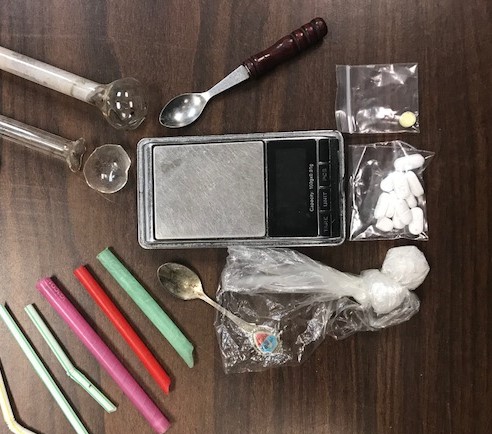
CULLMAN, Ala. – Drugs are a constant issue for law enforcement across Cullman County and, increasingly, they are finding their way into the day-to-day life of its citizens. A recent social media post showing drug paraphernalia found in a public bathroom prompted The Tribune to ask the Cullman Police Department (CPD) and Cullman County Sheriff’s Office (CCSO) what’s happening.
What drugs and what crimes?
Right now, methamphetamine and opioids- especially heroin- are the drugs causing the biggest headaches for the CCSO, according to Sheriff Matt Gentry. Lt. Jason Mickle of the CPD Crime Suppression Unit (CSU) said the city’s main problems are with meth and “repurposed” prescription medications (mostly opioids), with heroin on the rise and marijuana a perennial issue.
The CSU engages in proactive “boots on the ground” policing: making traffic stops and responding to reports by citizens by increasing patrols in areas where suspicious activities have been observed. It is not specifically a drug interdiction unit, but much of what it encounters is drug-related.
According to Gentry, more than 90 percent of all inmates in the Cullman County Detention Center are there for crimes involving drugs, and the issues go well beyond possession and distribution. People under the influence of drugs tend to make poor decisions, including getting behind the wheel of a car. When the addiction requires more drugs than addicts can afford, theft, robbery, prostitution and other crimes become fundraisers for their habits.
Said Gentry, “That’s what’s going to cause somebody to write bad checks. That’s what’s going to cause somebody to break into your house, commit a burglary, steal. It’s the root of all evil.”
Mickle echoed Gentry’s comments, saying, “The sad fact in our community: if you get out and you really start looking and digging into things, a lot of our thefts and a lot of other cases are related back to drug issues.”
Where are the drugs?
“There’s not a spike in one area or another area,” said Gentry. “You know, every community faces it. Every community is going to have somebody that’s a problem in drug use, whether it’s in the city of Cullman or out in the county. There’s not a community that’s immune to it.”
Gentry pointed out that Cullman County’s location along the I-65 corridor brings its own set of issues, saying, “On that interstate corridor, you’re going to deal with things on that corridor of people that are not from Cullman County. You’re going to deal with people coming into our community, stopping at the rest area, stopping at stores, convenience stores.”
According to the sheriff, people get off the interstate and seek out convenient sources of drugs in the local area before moving on.
Opioids, opiates and heroin
While the city cites pills and the county cites heroin, they are both talking about the same problem: opioid abuse and addiction. “Opioid” is an inclusive term for drugs, whether natural or synthetic, which act on the portions of the brain that control perception of pain. Within that broad category, the term “opiate” refers to derivatives of natural chemicals found in the opium poppy plant.
The most common opiates include heroin, morphine and codeine, while common synthetic opioids include methadone, oxycodone (often marketed as OxyContin), hydrocodone (often marketed as Vicodin) and fentanyl.
Said Gentry, “What we started seeing in 2011 was the opiate use go- so people were using pills, pills, pills. And I go from the 18 to 30 year olds: early college, kids in school. Why? It’s easy access.
“What we’ve noticed over the years is that increase in opiate use throughout the communities, which is why you see, today, heroin on the rise, because it’s addressing opiate addiction and it’s a cheaper method of an opiate versus going and trying to go to a doctor to get prescriptions, buy pills on the street. It’s a cheaper alternative.
“Like we talked about (at a recent seminar), the cartels know that, so they’ve pushed a product into the U.S. that’s meeting the needs of the communities as a whole, not just Cullman County, but other counties as a whole.”
Much of the heroin is coming into the U.S. from Mexico, and the amount of money going back there is unknown due to the efforts of cartels to hide the flow. Cash seizures have dropped substantially with the rise of online currency exchanges like Bitcoin. Even the most conservative guesses, though, range around $5 billion per year and up, as part of an international trade whose cash flow is estimated in the hundreds of billions per year. (According to research by The Washington Post and talkingdrugs.org)
Said Gentry, “Think about what we could do for our children, our schools, our communities with that money.”
Getting better or worse?
Comparing the first quarter of 2019 with the same period in 2018, the CPD’s drug arrests actually dropped slightly, but Mickle cautioned that the numbers don’t tell the whole story.
Said Mickle, “I would attribute a lot of that to our (Crime Suppression Unit) being short-staffed and undermanned. We had several people that we had to pull from our unit to go assist other divisions within the department, so I wouldn’t directly correlate anything back to any decrease or increase in numbers. If we had been at full staff, I would think that our numbers this year and last year would be pretty similar. So there’s not anything I see that’s indicating a huge change from last year to this year.”
He continued, “I’ll be honest with you: a lot of times, drug arrests and just because more people are getting put in jail or less people are getting put in jail, that does not always directly correlate with how much is being used on the streets, because we’re only hitting a very small amount of what’s going on. So those numbers don’t always directly correlate with what’s going on out in the public.”
“You see a lot in the media with arrests because we have proactive law enforcement in Cullman County,” said Gentry. “That doesn’t mean it’s any more or any less; it just means you have law enforcement officers that take pride in getting drugs off the streets.
“You know, we average about three drug arrests a day just at the sheriff’s office; that doesn’t count what the city of Cullman or Hanceville does. So we’re very blessed here to have proactive law enforcement.”
In a recent story on the increase in failures to appear (FTAs) in court since a federal court injunction required the CCSO and county courts to release most suspects on a non-monetary bond (https://www.cullmantribune.com/2019/06/06/out-on-bond-what-has-free-bail-meant-for-cullman-county/), The Tribune noted that Cullman County has seen an average of 16 to 17 more drug arrests per month since the injunction than before.
Gentry talked about one reason for the increase:
“I think what you see a lot of times is this: so, let’s say somebody FTAs. We go out, we stop them on a traffic stop or we go to their house to arrest them. Well, guess what? They’ve got more drugs. So we arrest them again, and so you’re going to see that number rise.
“So, as you don’t go to court and you’re not held accountable, then we go back out there, from their perspective, ‘Why would I not do that? Why would I not have more drugs, if I know that there’s no accountability on the judicial end?’ That’s what we face with everything that we’re dealing with.”
Right now, according to Gentry, even when they reach the courtroom, the average drug offender will be convicted of five felony drug offenses before he or she actually goes to prison.
Said Gentry, “Things that look good on paper in Montgomery or wherever, look good on paper, but it’s not reality.”
He added, “You know, prison reform did not help the citizens. When prison reform came out a few years ago, it was ‘Our goal is to release non-violent offenders back into society.’ Well, that doesn’t help the citizen that gets their house broken into. That doesn’t help the citizen that’s living next to somebody that’s got a hundred cars coming in and out of their driveway at night. You know, that’s releasing people back into society with no direction, no skills, no avenue to change their lives. And we’re all about rehabilitation.”
Fighting the good fight
At a recent seminar, Gentry told his audience that combating drugs is a three-step process:
“Number one, the most important thing we can do is educate our children,” said Gentry. “Educate them to what they’re going to face. Hey, be honest with our kids. My boys are 11 and 8, and I’m very honest with them about the effects of drugs: what it’s going to do to you, what it does to the community. That’s why we go out to the schools and we talk to these kids, because we want them to know what battles and challenges they’re facing.
“Second part of that is the enforcement. That’s why the deputies go out every day and enforce the law, and arrest them. If you want to be a drug dealer, hey, we’re going to put you in jail. If you want to run drugs, we’re going to do everything in our power to put you in jail.
“Then the third thing is the rehabilitation side. Again, I told you we have 300 inmates in our county jail, 300 inmates. We have 33 programs that come in, that minister to the inmates, that help them changes their lives. The way we look at it is this: if they can change their lives, then that’s a positive for all of us, because they’re back working, they’re back being productive members of society, they’re paying taxes. They’re back being mothers, fathers, grandparents again. So that’s very important to us on that side of things.”
Trying to keep up with a growing city and county
Gentry said, “Cullman County is one of the top growing counties in the state. So, growth is good, like we talked about, but the negative is: when you bring in growth, you’re also going to bring in a lot of problems from other areas. And we’re experiencing a little bit of that, you know, people that are not from here, things that are happening, whether it’s an overdose or people using drugs that are not from Cullman County. You know, we make a lot of arrests of people that are passing through.
“So it’s kind of a combination of things that we’re dealing with in law enforcement today. You’re dealing with the ones that are here that are using drugs, and then those that travel through or come in through growth.”
As the county population grows and brings with it both the advantages and disadvantages of growth, law enforcement struggles to keep up. The CCSO routinely asks for more funding in the Cullman County Commission’s budget to put more patrol deputies on the road and more detention deputies in the jail. Currently, eight patrol deputies per shift cover all areas of the 755-square-mile county outside Cullman City and Hanceville, which have their own police departments. On the other hand, the roughly 21 square miles of the city of Cullman are typically patrolled by five officers plus a sergeant and lieutenant, bolstered during peak call hours by the CSU.
Said Gentry, “Money’s always an issue, but one of the things that we’re stressing to the (County) Commission is, with growth- community growth- you have to grow your law enforcement. And again, you’re talking dollars and cents. And we’ve refigured, and we’ve added internally- not through the commission; I’m talking internally- we’ve been able to make some changes and shift some personnel around to put more deputies on the road than we’ve ever had. But we’ve not grown the office. You have to grow to meet those needs.”
Get involved
Mickle advised, “The biggest thing for the public: if anybody sees something, I would suggest that, if they’ve got any information, to contact the police department and make us aware. They can leave anonymous tips if they choose to, but we always try to aggressively follow up on any information that we have.”
The CPD central dispatch number is 256-734-1434.
Citizens can report criminal activity anonymously to the CCSO by calling the secret witness number at 256-734-0210. Through the office’s Nixle program, to which citizens can subscribe by texting 25sheriff to 888777, citizens can get alerts from the sheriff and also send anonymous texts to report a crime or suspicious activity. Being routed through the third-party Nixle system, the CCSO will not see the sender’s number.
Copyright 2019 Humble Roots, LLC. All Rights Reserved.





















